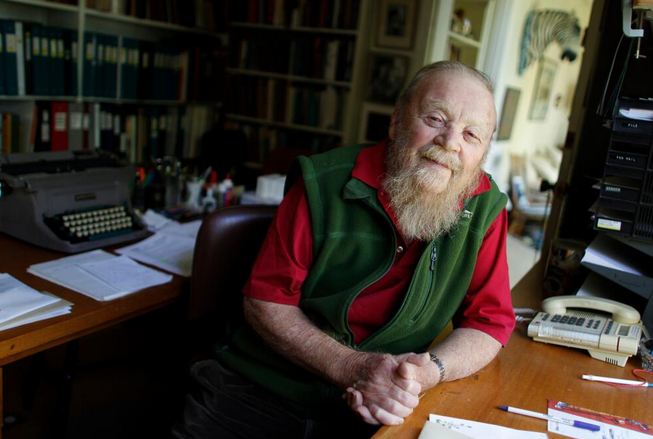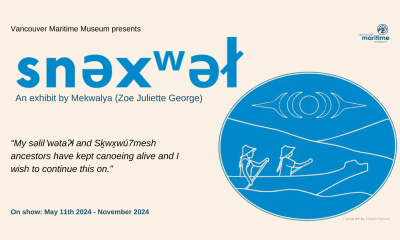Art and Culture
Remembering acclaimed Canadian author Farley Mowat

Farley McGill Mowat was a Canadian author and environmentalist. His works were translated into 52 languages, and he sold more than 17 million books. (Twitter photo)
TORONTO — Novelist and naturalist Farley Mowat was fondly remembered Wednesday for captivating generations of schoolchildren with books such as “Owls in the Family” and “Never Cry Wolf,” and for his legacy as a tireless defender of the environment who “spoke for whales and seabirds, for tadpoles and mosses.”
“He was possessed of a ferocious talent, able to write stories that provoked laughter, tears and action,” Green Party leader Elizabeth May added in a statement after news broke of Mowat’s death at age 92. “We owe him more than I can say.”
Prime Minister Stephen Harper also issued a statement, saying Mowat “will be remembered as a passionate Canadian.”
“One of Canada’s most widely read authors, he was a natural storyteller with a real gift for sharing personal anecdotes in a witty and endearing way. His literary works almost always reflected his deep love of nature and of animals.”
Mowat died Tuesday night in his hometown of Port Hope, Ont., his assistant Mary Shaw-Rimmington told The Canadian Press.
The internationally acclaimed author was an “absolutely delightful person” who had “strong opinions that he would fight for to the death if he had to,” said friend Stephen Smith, who learned of the death from Mowat’s wife, Claire.
“A highly, highly principled man, extremely generous with his time and his wealth,” he added. “Just a gem, a diamond in the rough.”
There was no word on a cause of death.
“He hadn’t been very well, it had been a tough winter, but everybody had a tough winter in southern Ontario,” said Smith. “But it had been particularly tough for him. He wasn’t very well. He was quite old. He had various issues, as people in their 90s usually do.”
From the time he was 13, Mowat was fiercely dedicated to writing about the natural world. As a young teen he started a magazine called Nature Lore and had a column in the Saskatoon StarPhoenix.
He went on to publish 45 books, many based on his own adventures and travels. Though many were written for adults, they had wide appeal and were frequently taught in schools.
Mowat said he was lucky to be able to combine his two passions: writing and nature, calling it “the only subject I really want to write about.”
“I often found he was one of the Canadian writers you could always mention and everybody would know his work,” said Howard White, publisher of Douglas & McIntyre, which took over Mowat’s books about three years ago and is reprinting his major works.
“It was due to that brilliant storytelling talent that he had, so it was never just a Canadian story, never just a First Nations story, never just an environment story. It was a story — a capital ‘S’ story that anybody anywhere could relate to.”
Throughout his life, Mowat was adamant that humans learn to live in harmony with the natural world.
“It’s a matter of survival,” he told The Canadian Press in a 2006 interview. “Either we learn to do this, or we cease to exist. We have no God-given right to survive forever. We have screwed up so badly in so many ways so obviously that only utterly stupid species would consider that we have much of a future, as things stand.”
“Never Cry Wolf” is said to have changed the way people saw wolves; after the Russian version was published, the government there even banned the killings of one of Mowat’s favourite creatures.
Barbara Stephenson, retired CEO of Port Hope Public Library who knew Mowat, recalls the book inspiring her to do a project on wolves in elementary school.
“I feel for me growing up, he was one of the first authors that highlighted our country, talked about Canadians (with) very Canadian settings and about the nature of our country and the environment,” she said.
The book, which was based on Mowat’s experiences studying wolves in the North — and became a film in 1983 — was not without controversy.
The May 1996 issue of now-defunct Saturday Night magazine featured an article by John Goddard titled “A Real Whopper,” accusing Mowat of exaggerating key facts in the book, such as how long he actually spent studying wolves in the North and if he visited an Inuit camp.
Mowat later issued a retort, saying Goddard “consistently misses the truth behind these ‘facts.'”
Mowat was born in Belleville, Ont., on May 12, 1921. The son of a librarian, he grew up in Windsor, Ont., and Saskatoon. He studied at the University of Toronto and served in the Second World War from 1940 to 1945.
In 1949, after spending two years in the Arctic, he began his career as a prolific writer of works have since been translated into more than 20 languages in more than 60 countries.
For the past few decades, Mowat split his time between Cape Breton, N.S., and Port Hope, Ont., where a monument stands in his honour on Smith’s property. The structure is in the shape of a boat to represent Mowat’s 2000 book, “The Farfarers: Before the Norse.”
“It’s a local limestone,” said close friend John Shaw-Rimmington, the husband of Mowat’s assistant. “He wouldn’t have approved of shipping anything in that was non-green.”
Mowat lived a “very private” life in Port Hope and wrote his stories on an old-fashioned Underwood typewriter at his home there, he added.
“I was talking to him on Saturday and actually he was writing that morning,” said John Shaw-Rimmington. “Said he was a little frustrated because he’d only written a paragraph and he said, ‘Tomorrow I’ll look at that paragraph and probably not even use it.'”
Mowat said the pleasure he got from writing was paramount.
“My motives have been selfish in a peculiar way,” he said, “not to attempt to gain recognition, fame, to become an icon, to become a Conrad Black or somebody like that, but simply to satisfy my own appetite for good stories.”
Never one to shy away from controversy, Mowat was outspoken about many environmental and social issues.
He called Canada’s treatment of aboriginals “abominable,” said the seal hunt was, “perhaps the most atrocious single trespass by human beings against the living world that’s taking place today,” and said hunts in general were “symbolic of the massive destruction that we’ve visited upon life.”
Although Mowat felt the struggle to preserve nature and wildlife was an ongoing one, he said: “I could honestly say I’ve fought the good fight.”
He was awarded the Queen Elizabeth II Jubilee Medal in 1956, the Governor General’s Award for his 1956 children’s story “Lost in the Barrens,” the Leacock Medal for Humour for “The Boat Who Wouldn’t Float” in 1970, the Order of Canada in 1981 and a Lifetime Achievement Award from the International Fund for Animal Welfare in 2003. He was also inducted into Canada’s Walk of Fame.
“Every book is a total experience in itself,” he said. “It’s a world in itself and when you finish the book you’re moving on to another world.”
Tributes to Mowat began to pour in as soon as word of his death broke.
In Ottawa, Liberal Leader Justin Trudeau said the author was “a family friend” from childhood.
“He came up to Harrington Lake a few times …. ah, got along great with my father,” said Trudeau. “He gave us a Labrador retriever who we called Farley who had a penchant for running after porcupines as I remember.”
He added: “Mr. Mowat obviously was a passionate Canadian who shaped a lot of my generation growing up with his books and he will be sorely missed.”
NDP Leader Tom Mulcair tweeted: “We have lost a great Canadian today. Farley Mowat’s work as an author and environmentalist has had a great impact on Canada and the world.”
Acclaimed novelist Margaret Atwood tweeted that Mowat was a “wonderful colleague & friend of many years,” while writer Andrew Pyper added: “Owls in the Family. One of the first books I aspired to copy. Farley Mowat, R.I.P.”
McClelland & Stewart, which published Mowat for many years, said “Canada has lost an icon and an irreplaceable spirit.”
“Farley Mowat broke the mould for Canadian literature,” Brad Martin, president and CEO of Penguin Random House Canada, said in a statement.
The Writers’ Union of Canada, of which Mowat was a founding member, lauded his “humour, spirit, and energy.”
“He said he would stand on his head in a public square, wearing his kilt, if necessary to promote Canadian Literature,” said a statement from Dorris Heffron, TWUC Chair and longtime acquaintance of Mowat.
“Fortunately, or not, he never found that necessary. Dear Fabulous Farley. He is truly unforgettable.”





















